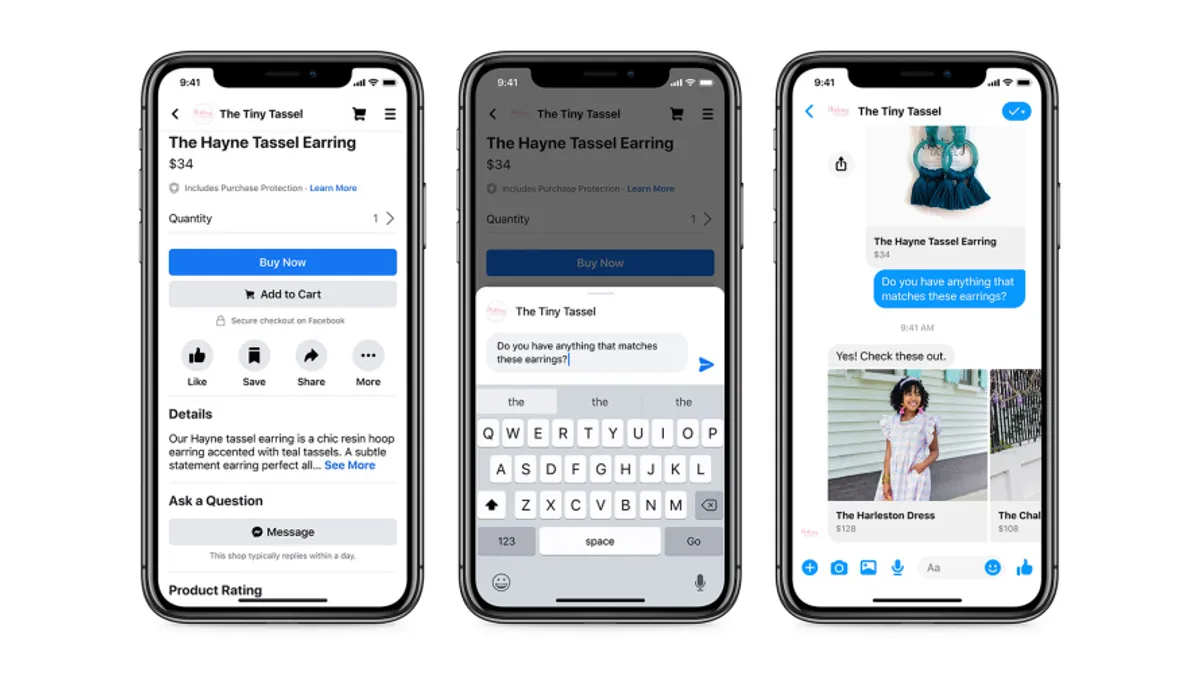Brief:
- Facebook added a shopping section to its main social networking app and plans to offer more software tools to help businesses set up online stores. Facebook Shop is a dedicated place for merchants to show product catalogs to shoppers who can buy items directly through the app, the company announced in a blog post.
- The company also plans to offer Instagram Checkout to all U.S. businesses, letting them sell products directly through the photo-sharing app. To use the service, businesses must have a shop in the app and use Facebook Commerce Manager or e-commerce platforms Shopify and BigCommerce. Facebook plans to support other platforms soon. The company is waiving selling fees through the end of 2020 to help small businesses during the pandemic.
- Facebook and Instagram Shops are integrated with the company's messaging apps, letting businesses answer questions from shoppers before they make a purchase. A messaging button connects shoppers with businesses through Messenger or Instagram Direct, while a test with WhatsApp will begin soon. Following recent pilots, the company also introduced a "live shopping" feature on Facebook and Instagram, letting merchants livestream a shopping session to customers. Instagram Live Shopping is available to all businesses and creators that use checkout in the U.S., per Facebook's blog.
Insight:
Facebook aims to help mobile marketers sell directly through its family of apps, including its main social network and Instagram, with this week's expansion of e-commerce features. The recent jump in e-commerce activity during the pandemic has hastened the company's move into online shopping, letting businesses convert Facebook and Instagram users into paying customers. The features are especially useful for small businesses or creators with limited financial and technological resources to set up a dedicated e-commerce site. Facebook previously tested the Shop section with a limited number of U.S. users before this week's rollout.
Features like live shopping can help businesses and creators set up miniature versions of home shopping channels to provide more in-depth product demonstrations to potential customers. Integrations with Facebook's various messaging apps also give marketers more ways to communicate directly with customers, especially younger shoppers who may prefer to chat with businesses instead of making a call. About a quarter (28%) of consumers said they usually try website chat first for general customer service issues, slightly less than the 31% of people who try a phone call first, per a study commissioned by call-center software maker Aircall.
For consumers, the new Facebook Shop tab in its app pulls together all digital storefronts into one place. Instead of searching for individual brands and retailers, users now have a single starting point to begin browsing product catalogs.
The U.S. rollout of Instagram Shop as an e-commerce hub follows its official introduction last month among a select group of marketers. Instagram Shop offers personalized recommendations, exclusive items and collections of products from brands and creators, along with a curated selection of goods from its @Shop shopping channel. Facebook Pay, the social network's payment processing service, gives shoppers who use Instagram Checkout extra security features including a personal identification number (PIN), fingerprint scanning and facial recognition.
Instagram in the past few years has gradually added more shopping features, and in June allowed more businesses and content creators to sell merchandise through its platform. After debuting Checkout on Instagram in March 2019, the app launched an @Shop account to showcase products from emerging brands among a variety of categories. Two years ago, Instagram introduced a dedicated shopping channel in its Explore tab and stories, and later created a collection tab to let users save products they'd tagged in the app for later purchase.
For Facebook, the expansion into e-commerce can help to support its advertising business as merchants promote their online storefronts in its apps. While the company isn't currently collecting commissions on e-commerce sales to help support ailing small businesses, transaction fees can potentially become a more significant source of revenue for the company.














